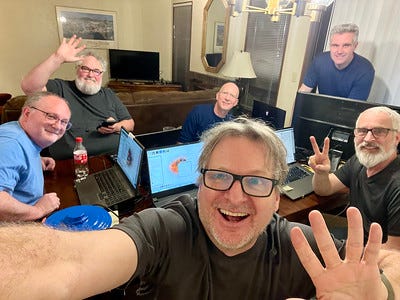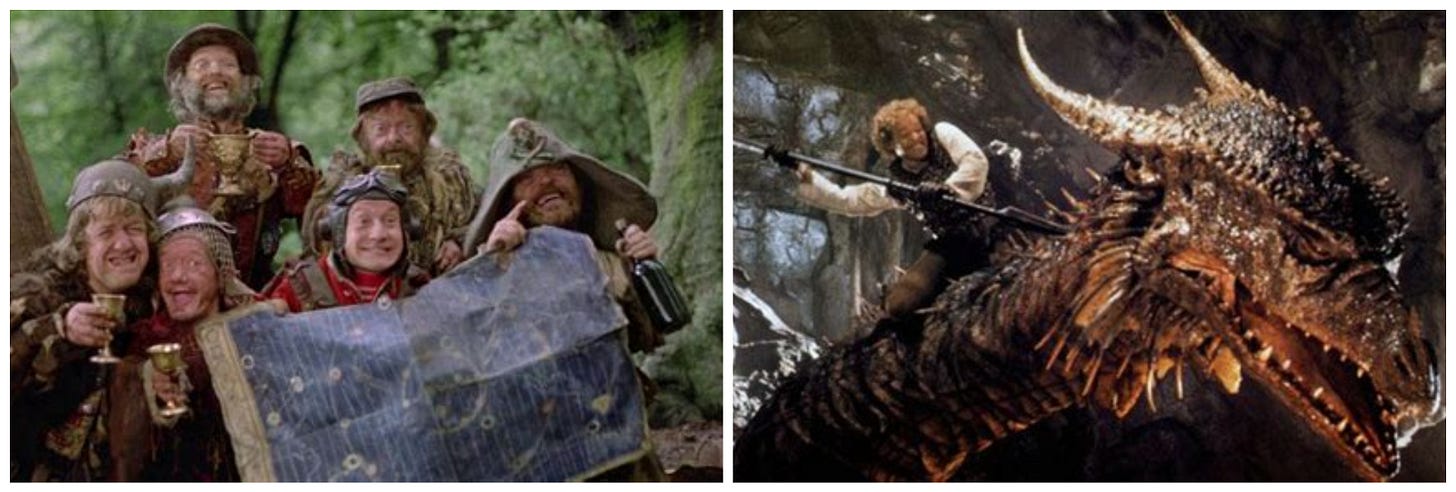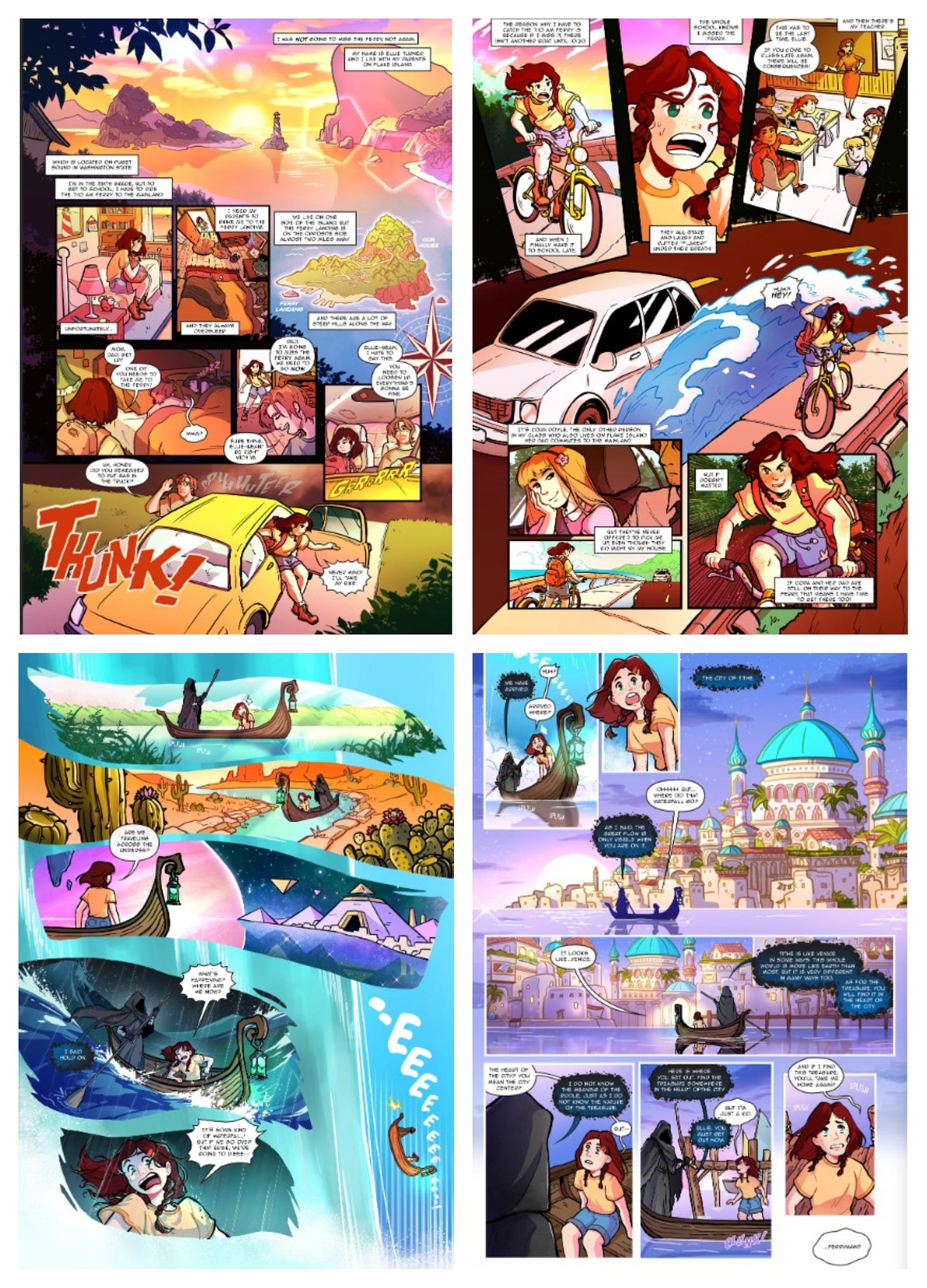It's Hard to Explain How Uncool It Used to Be to Be a Fantasy-Loving Dork
These days, fantasy is popular and respected. But it wasn't always.
When I was a kid back in the 80s, I loved all things fantasy: movies, books, comic books, and video and role-playing games. I wanted to grow up and write fantasy books and movies for a living.
These days, these interests would be considered completely normal or maybe even cool.
But back then, it meant I was almost unimaginably uncool.
There were names for the kind of person I was: geek, nerd, dork. And this was way before these terms had all been reclaimed and ironically celebrated. Back then, they were genuine insults.

For me, one of the strangest things about growing older has been discovering the concept of “baseline readjustment”: how the younger generations see the status quo as “normal,” even if it happens to be a radical break from whatever came before.
Over the last forty years, the fantasy genre has gone from being maligned to being celebrated — from fringe culture to mainstream culture.
Geek culture is now the culture.
And if you didn’t live through it, it’s hard to explain how incredible the transformation has been.
As kids, my friends and I collected comic books, and read The Lord of the Rings, A Wizard of Earthsea, and every other fantasy novel we could get our hands on. We also played Dungeons & Dragons.
But at the same time, we were all very aware that we were part of a sub-culture, not the greater, mainstream culture. All the stuff we loved was considered unserious — silly, frivolous stuff for kids.
Among my classmates, these strange new devices called “video-games” were considered cool, but the actual fantasy novels and role-playing games upon which these games were based were emphatically for geeks only.
None of this made sense to me. At its best, fantasy was rich and complicated with grand themes and big ideas. These were stories that had to be told.
More than anything else, I wanted the rest of the world to see what I saw.
To put it in fantasy-esque terms, my friends and I saw ourselves as keepers of a kind of “sacred flame” of fantasy: keeping a flickering ember alive until the rest of the world would finally choose to join us to bask in its warmth and goodness.
If nothing else, maybe people would finally stop mocking me for loving fantasy so much.
The first Star Wars movie was released in 1977, and, yes, it was considered cool too, like video-games. But it also seemed like kind of a one-off. People didn’t yet know what a Truly Big Deal it would be.
(They also didn’t realize it was fantasy, not science fiction. George Lucas said as much back in 1977: “Star Wars is a fantasy, much closer to the Brothers Grimm than it is to 2001[: A Space Odyssey].”)
By the 80s, America was already in the middle of a massive — and truly bonkers — backlash against Dungeons & Dragons, which many right-wing parents considered to be “Satanic.”
But with the mainstream success of Star Wars and the rise of video games, movie studios finally started investing some serious bucks in science fiction, which had usually been cheaply done or exploitative before.
And sometimes the Powers That Be even deigned to finance outright fantasy.
With every new fantasy movie, I was always there on opening night.
Some of these movies were terrible: The Beastmaster, Legend, Krull, The Sword and the Sorcerer, the two original Conan movies, and yes, even Jim Henson’s beloved misfire Labyrinth.
But some of these new fantasy movies were entertaining, even if flawed: Clash of the Titans, The Dark Crystal, Willow, Fire & Ice, The Neverending Story, Heavy Metal, Excalibur, and Ladyhawke.
And some were flat-out extraordinary: Time Bandits, Dragonslayer, The Princess Bride, Beetlejuice, and The Secret of NIMH.
Alas, it was mostly the joke-y, irreverent fantasy movies that were the break-out hits: Ghostbusters, Mannequin, Bill & Ted’s Excellent Adventure, and Gremlins. Or broad, accessible movies like Indiana Jones and Big.
I loved some of the latter movies — at least Indiana Jones and Big — but none communicated exactly what I loved about fantasy.
It was even worse in the decade that followed, with the only break-out successes being fantasy-lite movies like Ghost, Jumanji, The Mummy, and the animated movies from the first Disney Renaissance: The Little Mermaid (1989), Beauty and the Beast (1991), Aladdin (1992), and Hercules (1997).
But then came the one-two TV punch of Xena: Warrior Princess (1995-2001) and Buffy the Vampire Slayer (1997-2003): bold, creatively rich stories that also happened to revolutionize the portrayal of women and LGBTQ people in fantasy.
And then: the superhero deluge. I remember reading an article in 2000 about X-Men — the first X-Men movie — how concerned the producers were about superhero “costumes” which they thought would look ridiculous to mainstream audiences. Rather than capes and tights, they had chosen chic matching leather outfits.
In 2001, we saw the first Harry Potter movie, followed a few weeks later by the first of the Lord of the Rings movies — which was probably even more influential for the fantasy genre than Star Wars, if only because it was so obviously fantasy.
And also because it was made for adults. It couldn’t have taken fantasy more seriously, and the movie series couldn’t been taken more seriously: the three-movie series was nominated for a total of thirty Academy Awards — and won seventeen.
Meanwhile, in a few years, the equally serious TV show Game of Thrones (2011-2019) was nominated for an incredible 164 Emmy awards — and won a record-breaking 59 of them (22 more than the previous record-holder, Frasier).
Some of the dorks like me who loved fantasy so much when we were kids? They grew up to make some of the best fantasy that’s ever existed.
The incredible (and incredibly well-deserved) success of both The Lord of the Rings and Game of Thrones was very emotional for me — and weirdly vindicating. I’m less of a Harry Potter fan, but I found that massive success gratifying too.
That “sacred flame” of fantasy that I said my friends and I used to nurture? The whole world now seemed to be basking in its raging fire. Even Halloween, which used to be strictly for kids, became a holiday celebrated by young and old alike.
Now everyone can see how great fantasy is! I thought. That it’s not just for kids!
What I’d wished for back in the 80s — for people to see what I saw — had all come true.
But as a fantasy enthusiast, I should have expected what came next. How many times have I seen the story of a person being granted their wish — and how it’s never exactly what they thought it would be?
On one hand, it’s currently a great time for a fantasy-lover to be alive. Fantasy movies are common now (although they’re still wildly hit-and-miss. I found Everything Everywhere All at Once to be overstuffed and overlong, and Dungeons & Dragons: Honor Among Thieves was exactly what I most feared: a stream of ironic quips that craps all over its source material. And here’s a hill I’ll die on: Wonka was absolutely terrible. His wonderful mother taught Willy to make magical chocolate but not to read? I’d say this is preposterous and/or child neglect bordering on abuse, but it’s really just lazy writing.)
Meanwhile, fantasy is even more popular on TV, and if a lot of it has been sub-par, I’ve loved Stranger Things, Spartacus, The Good Place, The Chilling Adventures of Sabrina, and (for a while) Supernatural.

On the other hand, when something becomes “mainstream,” it changes. Many people now seem to be creating fantasy stories not for sheer love of the genre, but to make money.
I’m not the first to say that Hollywood is currently in love with sequels, prequels, reboots, remakes, spin-offs, and “supplemental” TV shows. But they seem to do this most with sci-fi and fantasy.
Frankly, it’s hard for me to believe that the same people who made The Lord of the Rings movies also made the unwatchable Hobbit series. Were they just cashing in?
When I was a kid, George Lucas told the world that he was going to make nine — or maybe twelve? — Star Wars movies, and I was so excited. But now I see that what I really wanted wasn’t nine or twelve Star Wars movies: I just wanted more movies that made me feel the way that first one did.
But the only way you can create that particular sense of wonder and breathless discovery is to tell new stories — not just endlessly and cynically recycle the same old ones.
Certain fantasy subgenres are simply tapped out. Virtually anything interesting you might say about, say, superheroes or vampires has long been said. Every imaginable theme has now been explored.
These days, when I hear the expression “fairytale retelling,” I want to claw my ears out.
Nostalgia is a fine and powerful emotion, but it’s not the only emotion.
Yes, I get it: Hollywood has somehow convinced itself that audiences won’t respond to a project unless people recognize its “intellectual property” — i.e., some familiar story.
But they turned out for the original Star Wars. And Xena: Warrior Princess. And The Lord of the Rings. And Game of Thrones.
If corporate Hollywood’s opinion of the audience truly is that low, maybe they shouldn’t be in the business of telling stories in the first place.
So here we are again, with me once again desperately wanting things to change — for things to get better.
But maybe that’s not such a bad place to be. After all, this is the start of almost every fantasy story ever told — at least according to Joseph Campbell in his influential 1949 book The Hero with a Thousand Faces.
Is my dissatisfaction with the state of contemporary fantasy my own Call to Adventure? After all, I’m a writer. Is it time for me to set off on some kind of literary quest — through regions of peril and darkness with mysterious forces opposing me every step of the way?
As chance would have it, I have a new project: a graphic novel for kids called The Ferryman that I think captures the fun and adventure of classic fantasy — but also takes the genre to places it’s never been.
Now I just hope my agent can sell the damn thing.
Brent Hartinger is a screenwriter and author. Check out his other newsletter about his travels at BrentAndMichaelAreGoingPlaces.com.






The Beastmaster is legendary. I'll accept no rebuttal.
Hey, nice! The visuals look great! Fingers crossed your agent can do their bit as part of your Call to Adventure.